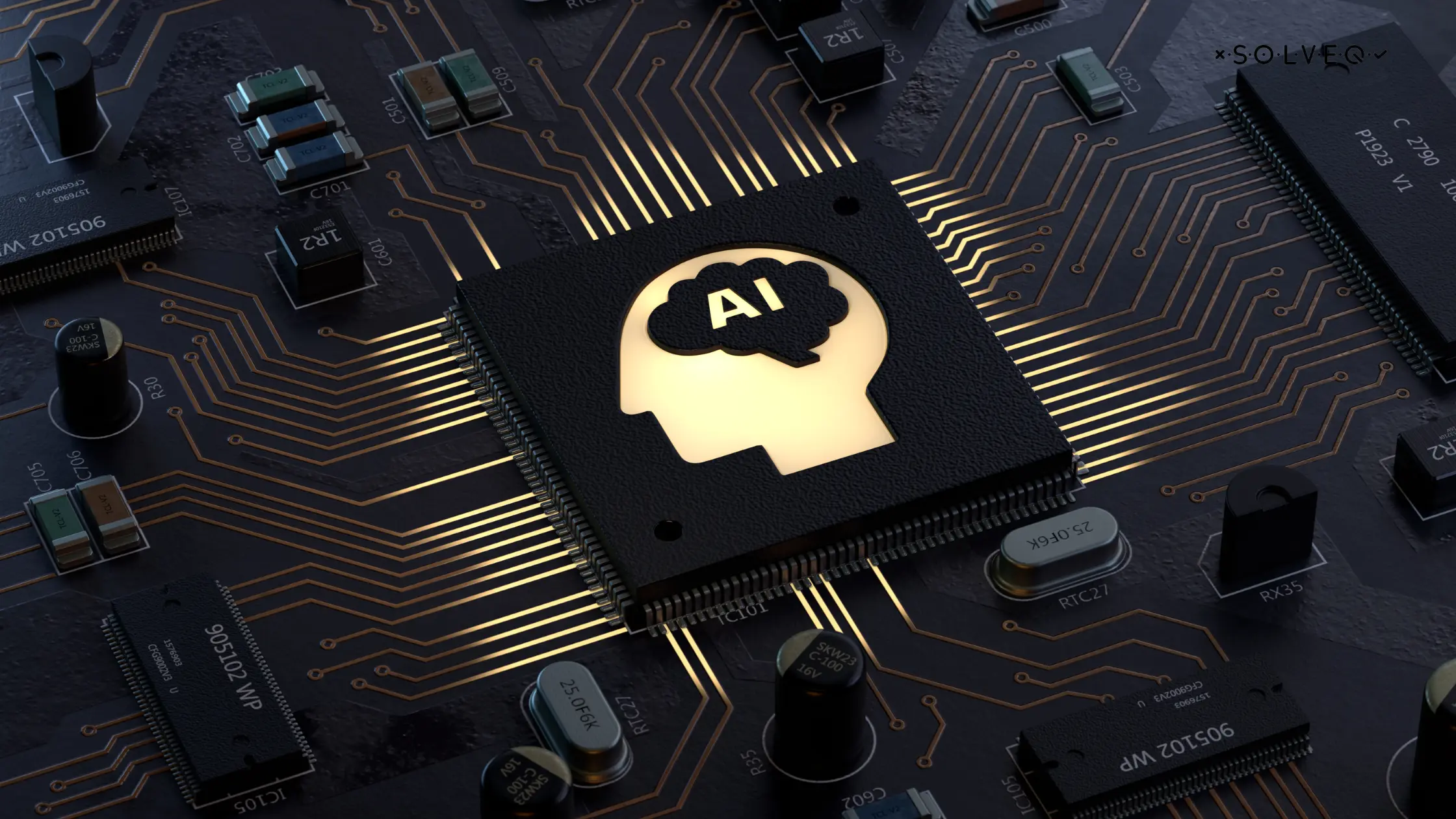Artificial Intelligence's Impact on digital transformation
12 Apr 2023 • 14 min read

Marcin Kulawik

Regarding app development, integrating artificial intelligence (AI) is becoming increasingly important. But what exactly is AI? Simply put, AI is the ability of machines to perform tasks that typically require human intelligence, such as visual perception, speech recognition, and decision-making.
In software development, AI has become a game-changer. By leveraging AI services, developers can improve their apps in many ways. From natural language processing (NLP) to predictive analytics, AI can help create a more seamless user experience and increase efficiency and productivity. As an AI development company, we would like to give you an overview of how artificial intelligence can help businesses.
AI Services in App Development
I am sure you have heard about AI Services in software development before. The rise of artificial intelligence (AI) in recent years has revolutionized how we approach app development. With AI, developers now have access to many powerful tools to help them create more efficient, productive, and user-friendly apps. Currently, there are four main types of AI Solutions one can implement into digital products:
Natural Language Processing (NLP)
One of the most exciting aspects of AI services in app development is the ability to leverage natural language processing (NLP). NLP allows machines to understand and interpret human language, so developers can create chatbots, virtual assistants, and voice assistants that are more intuitive and engaging for users. Imagine having a natural conversation with your phone, asking it to perform tasks for you, and having it respond in a way that feels like a human conversation. This is the kind of experience that NLP can deliver.
Machine Learning
Another powerful AI service is machine learning (ML), which enables apps to learn and adapt to user behavior. This means that apps can become more personalized over time, providing a tailored experience that meets the unique needs of each user. For example, an e-commerce app could use ML to recommend products based on a user's previous purchases, browsing history, and other behaviors.
Predictive Analytics
Predictive analytics is another AI service that can be used in app development. With predictive analytics, apps can make more accurate predictions about user behavior, which can help businesses make better decisions about how to engage with their users. By understanding user behavior, companies can create targeted marketing campaigns, offer personalized promotions, and more.
Computer Vision
Computer vision and speech recognition are two other AI services that can help improve the accessibility and usability of apps. Computer vision can enable users to interact with an app using their camera, while speech recognition can allow users to interact with an app using their voice. These services can help make apps more intuitive and user-friendly, especially for users with difficulty using a traditional touchscreen interface.
As AI technology advances, we can expect to see even more exciting applications of this powerful technology in app development and beyond.
Benefits of Using AI Services in App Development
Whether you're developing a new app or improving an existing one, exploring the possibilities of AI can help you take your app development process to the next level. So, what are the advantages of implementing AI technology in your company?
Improved User Experience:
AI services can help you create apps that provide your users a seamless and intuitive experience. By leveraging technologies such as natural language processing and machine learning, you can create chatbots, virtual assistants, and voice assistants that are more engaging and personalized. These apps can provide instant support, allowing users to complete tasks and find information quickly and easily.
Increased Efficiency and Productivity:
By automating tasks and processes, AI services can help you increase efficiency and productivity in your app development process. For instance, you can use AI to automatically categorize user data, which can help you identify trends and patterns in user behavior more quickly. Additionally, AI-powered tools can help you identify areas where you can streamline your workflow, allowing you to focus on high-priority tasks.
Better Decision-Making:
AI services can help you make better decisions about engaging with your users, improving your product offerings, and more. You can better understand your users' needs and preferences by analyzing user data and generating insights. This can help you make data-driven decisions about where to invest your resources and how to optimize your app development process.
Personalized Content:
With AI, you can create apps that deliver personalized content to each user. Machine learning algorithms can analyze user behavior and preferences, allowing you to create tailored experiences that cater to each user's unique needs. For instance, you can use AI to recommend content, products, or services relevant to each user, increasing their chances of engaging with your app.
Enhanced Security:
AI services can help you enhance the security of your apps, protecting your users' data and preventing fraudulent activity. For instance, predictive analytics can help you identify and prevent fraudulent transactions, while natural language processing can help you detect and block spam messages. You can build trust with your users and protect your brand reputation using AI-powered security features.
Using AI services in app development can help you create more engaging, efficient, and secure apps. By leveraging the power of AI, you can create apps that provide a personalized experience for each user, help you make better decisions, and improve your bottom line.
Challenges of AI Services in App Development
While the benefits of using AI services in app development are numerous, there are also some challenges to consider. Here are a few of them:
- Data Privacy: One of the biggest challenges of using AI in app development is ensuring data privacy. With AI comes the need for large amounts of data, which can be a potential privacy risk if not handled properly.
- Bias: Another challenge of using AI services in app development is the potential for bias. AI is only as good as the data it is trained on, and if that data is biased, it can lead to biased outcomes. This is particularly important to consider when developing apps that deal with sensitive issues such as finance or healthcare.
- Reliability: AI services are not always 100% reliable, and there is always a risk of errors or malfunctions. This can be especially problematic in apps that rely heavily on AI, such as speech recognition or predictive analytics.
While AI services in app development offer many benefits, it is important to be aware of these challenges and take steps to mitigate them. By prioritizing data privacy, working to eliminate bias, and ensuring reliability, businesses can harness the power of AI while minimizing potential risks.
How AI Technologies Help on the Road to Digital Transformation
Artificial intelligence (AI) solutions are not limited to app development but can also be used across different business sectors to provide numerous benefits. AI is revolutionizing how businesses operate and offers a competitive edge to those who implement it effectively. AI significantly contributes to various industries, from financial services to healthcare and transportation. In this regard, let's look at some examples of how AI can be used in business sectors and the benefits it can provide.
- Finance Services: AI can be utilized in financial services to detect fraudulent activities, assess credit scores, and analyze risks. It can also automate time-consuming manual processes, such as invoice processing and underwriting. For instance, JP Morgan Chase has implemented an AI-powered fraud detection system that uses machine learning algorithms to identify potentially fraudulent transactions.
- Marketing: AI can help marketers in customer segmentation, personalized recommendations, and predictive analytics. AI-powered chatbots and virtual assistants can also improve customer service by providing quick and accurate responses to customer queries. An example of this is Sephora's chatbot, which uses AI to provide personalized product recommendations to customers based on their preferences and purchase history.
- Healthcare: AI can assist healthcare professionals in disease diagnosis, drug discovery, and patient monitoring. With AI-powered tools, healthcare providers can create personalized treatment plans and predict patient outcomes more accurately. An example is IBM Watson's AI-powered clinical decision support system that assists doctors in diagnosing and treating patients with various medical conditions.
- Retail: AI can be used for inventory management, demand forecasting, and personalized recommendations. AI-powered chatbots and virtual assistants can also improve customer service by providing customized product recommendations and answering customer queries. An example is Amazon's recommendation system that suggests products to customers based on their purchase history and browsing behavior.
- Manufacturing: AI can be used in manufacturing for predictive maintenance, quality control, and supply chain optimization. With AI-powered tools, manufacturers can optimize production processes, reduce downtime, and improve product quality. An example is Siemens' AI-powered platform which helps manufacturers optimize production processes by analyzing data from machines and sensors.
- Transportation: AI can assist in transportation for route optimization, predictive maintenance, and supply chain optimization. AI-powered tools can also help reduce congestion and improve safety by providing real-time traffic updates and enabling self-driving vehicles. An example of this is Tesla's self-driving technology which uses AI-powered algorithms to navigate roads and avoid obstacles.
Businesses can streamline processes, reduce costs, and improve customer service by leveraging AI solutions. As AI technology advances, we can expect to see even more applications across various business sectors.
The Future of AI Technologies in Business
The future of AI technologies in business is bright, and we can expect continued growth and innovation in this field. AI has the potential to revolutionize the way companies operate, providing new opportunities for efficiency, productivity, and cost savings. Some of the key trends that we can expect to see in the future of AI in business include:
- Increased use of predictive analytics: As AI algorithms become more sophisticated and capable of handling more extensive and complex data sets, we expect to see increased use of predictive analytics in business. This will enable companies to make more accurate predictions about customer behavior, market trends, and other factors that can impact their bottom line.
- More automation: AI technologies will continue to play an increasingly important role in automating manual processes and tasks, freeing employees to focus on higher-level work that requires human judgment and creativity.
- Greater personalization: As AI becomes more adept at understanding and analyzing customer data, we can expect to see more personalized products and services tailored to individual needs and preferences.
- Improved cybersecurity: AI technologies can help businesses better protect themselves from cyber threats by identifying and responding to potential breaches more quickly and effectively.
Overall, the future of AI in business looks promising, and we can expect to see continued growth and innovation in this field in the years to come.
Summary
In conclusion, AI has become a crucial component in app development. AI services such as NLP, ML, predictive analytics, computer vision, and speech recognition can enhance user experience, increase efficiency, provide better decision-making capabilities, and improve the security of apps. AI solutions also transform various business sectors, such as finance, marketing, healthcare, retail, manufacturing, and transportation. Looking ahead, the future of AI technologies in app development is promising, with the potential to bring even more advanced and innovative features. As businesses continue to explore the benefits of AI, they can turn to AI development companies such as SolveQ to help them on their digital transformation journey. Contact SolveQ's AI consultants to discover how they can help businesses integrate AI into their app development process.
Share:
Looking for expert development team?
Schedule a call with Tech Consultant

Marcin Kulawik
Founder and CEO of SolveQ. Huge fan of building things with purpose, agility, and having fun while changing the World. Loves his family, teammates, and nature.